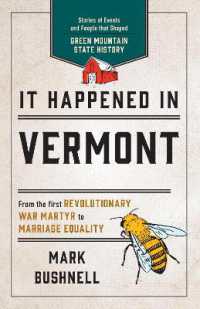- ホーム
- > 洋書
- > 英文書
- > Nature / Ecology
Full Description
What good is persuasion if no one
is paying attention? Why Just Stop Oil's resolute young campaigners chose civil
disobedience.
The climate crisis deepens with terrifying predictability. Meanwhile, many
of the young campaigners who seek to wake us up to the truth of this, through
peaceful direct action, are silenced and stuck in prison.
They do not see themselves as brave heroes, nor as dangerous
extremists; they do care about science and the role it should play in
government policy. As their personal profiles in the book reveal, their civil
disobedience is driven by desperation, but motivated primarily by love - for
those who have already felt the impact of a radically changing climate and for
those whose lives will be blighted in the future, often in countries which have
done least to cause the crisis.
Misrepresented and often reviled in the media, Just Stop Oil and other
'Radical Flank' environmental campaigners will be deservedly recognised in
future, just as the Suffragettes have been, for the crucially important role
they continue to play in the climate movement. Theirs is a generation
systematically betrayed by politicians. And by all of us who allow this to
continue, on our watch, year after year.
Six years on from the biggest climate protest in history in 2019, led
by Greta Thunberg, young people remain largely shut out of ever more
dysfunctional political processes, able only to beg for the scraps of a 'just
transition' that would at best mitigate the coming devastation, much of which
is now unavoidable.
Just Stop Oil stopped active campaigning in March 2025. But for most
of its remarkable young activists, the work of civil resistance goes on. They
continue to shoulder the burden of attempting to secure change in a world
locked into a deeply damaging status quo.
Jonathon Porritt spent a year working with twenty-six Just Stop Oil
campaigners to co-create Love, Anger & Betrayal, driven by a fierce
commitment to Intergenerational Justice. The campaigners feel part of the
interlinked chain of humanity, empathising more powerfully with future
generations than so many of us, even when many of them may well decide never to
have children of their own.
Contents
CONTENTS
INTRODUCTION
CHAPTERS
1. ON THE FRONT LINE
2. CLIMATE SCIENCE
3. CLIMATE POLITICS
4. THE FOSSIL FUEL INCUMBENCY
5. EVERYTHING'S CONNECTED
6. TAKING DIRECT
ACTION
7. THE WEIGHT OF THE LAW
8. THE EMOTIONAL BURDEN
9. INTERGENERATIONAL JUSTICE
10. WAYS FORWARD








